Overhead Crane Hoist – overhead hoist – double hoist overhead crane – hoist crane – bridge crane hoist – hoist crane design – hoist overhead crane – what is a crane hoist?
Crane vs. Hoist: What’s the Difference?
First things first – a hoist helps to do one thing: move heavy loads up and down. An elevator is probably the most well-known hoist. Elevators are the perfect machine for transporting loads vertically, but in no other direction (unlike a crane’s functionality).
On the other hand, a crane can move in two or three dimensions. Overhead cranes suspend from a beam or move along a rail. Just like cement is a component of concrete, a hoist is a central part of an overhead crane. Essentially, the crane moves the hoist around.
suspend from a beam or move along a rail. Just like cement is a component of concrete, a hoist is a central part of an overhead crane. Essentially, the crane moves the hoist around.
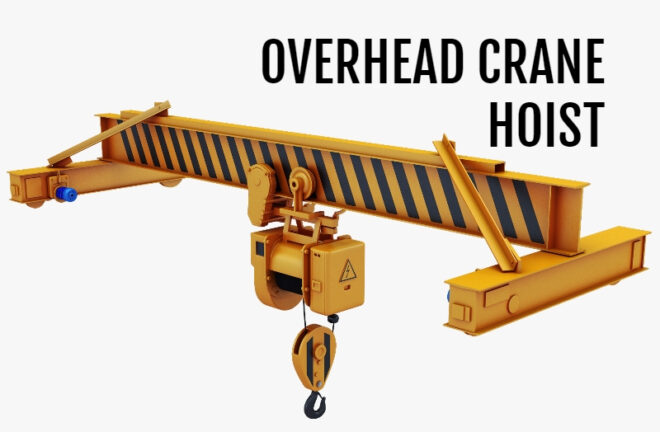
Overhead hoist
Chain hoist crane – overhead hoist: Hoists and cranes are both machines that help move and lift heavy loads on the job site, but they have many fundamental differences in design and usage.
Below, we set the record straight about what each of these devices does, and how they work together to assist in your next project.
Chain hoist cranes are suitable for a wide variety of industrial and specialized applications.
Whether you need a work station crane, an overhead traveling crane or a rotating crane, chain hoist cranes are always the ideal choice.
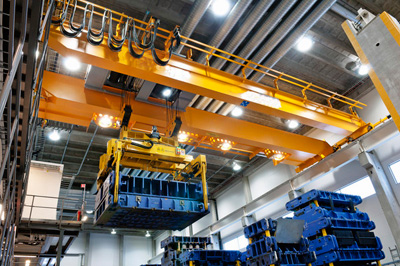
Hoist crane design
Overhead crane design – hoist crane design: It is understood that each client is different and so are their needs; custom cranes are designed and built to meet the individual requirements of your application.
You may want to buy a full chain hoist crane or upgrade your existing crane with an electric chain hoist. You can choose a single or double bridge beam crane for your work area.
A simple bridge beam crane can be a bridge type profile or drawer. A suspended crane can be installed if your building does not allow the construction of a column.
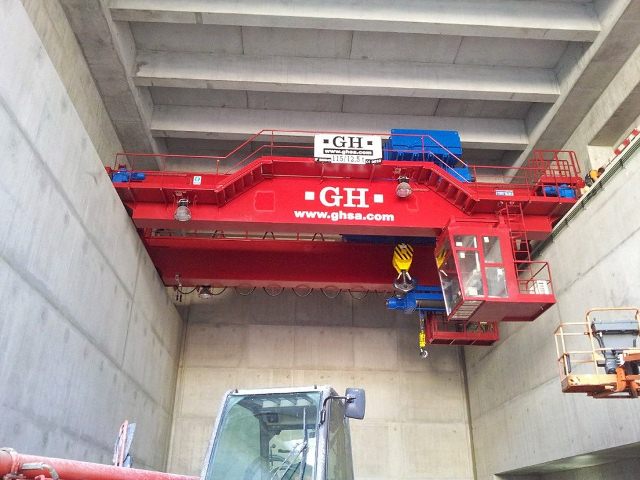
Overhead crane safety
The steel structure is strong and durable and the design has been optimized to reduce the stresses it exerts on your building.
Its operators can exert an optimal control over the load thanks to the control with an inverter of continuous speed along with the rolling.
An electric limit switch keeps you and your hoist protected from electrical overloads.
Since it minimizes the free height and the approach of the hook, it has a maximum space to perform other types of operations under your chain hoist crane. You can also install shock detection devices on the crane and in the car to further improve your safety.
Overhead Crane Types
Types of Overhead Cranes: The type of crane you have determines what your hoist will do for you. Some of the most common overhead crane types include:
- TOP RUNNING CRANE: The bridge moves atop a pair of rails mounted to the ceiling, allowing for heavy loads to be lifted and moved.
- UNDER RUNNING CRANE: The bridge travels along the bottom flange of two beams. Certain buildings’ construction might require this type of crane for your project.
- GANTRY CRANE: A single or double girder attaches to a pair of broad legs with wheels, enabling the crane to operate without being attached to the ceiling. These are popular cranes in shipbuilding.
- MONORAIL CRANE: The hoist attaches to a trolley on a single rail that follows a path around the facility in an oval or snaking path. This is effective for moving around a complex space.
Types of Hoist
Hoists are defined by their lifting medium, power, and suspension.
LIFTING MEDIUM: The lifting medium is the flexible material that connects the load hook to the overhead body of the hoist. It can be either a rope, metal cable, welded link chain, or roller load chain. Welded link chain, like an anchor chain, is a series of identical metal loops attached together to form a string. Roller load chain, like a bike chain, is made from alternating roller links and pin links to form a line that easily engages with a toothed sprocket.
POWER: Hoists can be powered manually, electrically, or pneumatically. Manual hoists use a pulley to multiply the operator’s pulling force. You can also use electricity or air power to actuate a hoist motor. Choose what’s easiest to access. Factories with many air tools might find air power more convenient.
SUSPENSION: The suspension method for a hoist depends on how it will be used. A stationary hook-mounted hoist is a simple solution when you only need to move a load straight up, such as from a truck to a trailer. Meanwhile, a hoist bolted to a beam will handle heavier loads. A hoist can be mounted to a trolley running along a beam or a rail, giving you the ability to lift up then across the facility. Gantry cranes give you three-dimensional motion. You can lift up, move the hoist along the gantry rail, then move the crane itself wherever you need it.
Double hoist overhead crane
Double hoist crane is a single girder crane with two Electric hoists for efficient material handling. Double hoist cranes have various designs such as double hoist Overhead Crane, and double hoist Gantry Crane.
Which double hoist crane is ideal for your application?
Double hoist crane
Double hoist crane is usually for indoor use, such as in the workshop, warehouse for handling and lifting small and medium tonnage items.
Generally, when choose or use double hoist crane, we usually consider it with one electric hoist, while in some specific situation, which need two electric hoists hoisting together, then the double hoist crane should be equipped with two electric hoists.
Bridge crane hoist
Overhead hoist and crane – bridge crane hoist: When the double hoist crane needs to be equipped with two electric hoists, the following items should be considered.
Two electric hoists capacity does not exceed the design capacity of the double hoist crane. That is, if you want to hang two 1Ton electric hoists, the double hoist crane lifting capacity should be 2ton or more.
If the double hoist crane total lifting capacity is greater than or equal to 1Ton, it needs the enterprise which has relevant qualifications to carry out the reconstruction.
Overhead crane anti collision system
Anti-collision device: If the two electric hoists use distance is far, it can directly use travel switch or photoelectric switch for the anti-collision setting.
- If the general use distance is near or sometimes use in the adjacent place two of the two electric hoists, you should pay attention to the closest position when installing during load and no load.
- If it is two-speed, it is best to limit the fast speed first, and then stop it (two tap positions).
- If the lifting item is long, it can be designed to operate with one switch, which can be operated simultaneously or individually.
- The power supply cable direction: on both ends of the single beam, respectively power supply to the two hoists, or power supply directly by safety slide wire.
Double hoist crane is used for efficient material handling. Double hoist cranes have various designs such as double hoist overhead crane, and double hoist gantry crane.
What is a crane hoist?
Difference Between Hoist and Crane:
- A crane incorporates the uses of other simple machines including the hoist to develop a more effective mechanical device that will make the moving of loads and objects easier and faster.
- A hoist is a device used for lifting and lowering loads while a crane is a device used for moving loads in different directions.
- A hoist is a simple device while a crane is a more complex device.
- A hoist can only move loads vertically while a crane can move loads vertically and horizontally.
Overhead Crane Hoist
How do overhead cranes work?
A crane is a machine designed to lift and distribute loads in space suspended from a hook and hoisted by a hoist. As a rule, they are equipment that has grooved pulleys, counterweights, simple mechanisms, etc. to create mechanical advantage and move large loads.
-A hoist is a device used for lifting and lowering loads while a crane is a device used for moving loads in different directions.
-A hoist is a simple device while a crane is a more complex device.
-A hoist can only move loads vertically while a crane can move loads vertically and horizontally.
A gantry crane is a type of overhead crane that is similar to a bridge crane, but instead of moving on suspended runways, the crane uses legs to support the bridge, trolley, and hoist. These legs travel on tires or on rails that are embedded in the floor or ground structure.
Overhead cranes cover a rectangular area, moving a load side to side and backward and forward.
They typically incorporate a top running trolley hoist which moves along the top of the two bridge beams on its own set of wheels for increased headroom under the crane; also called a top running crane.
A gantry crane is a crane built atop a gantry, which is a structure used to straddle an object or workspace. They are also called portal cranes, the “portal” being the empty space straddled by the gantry.
The most read
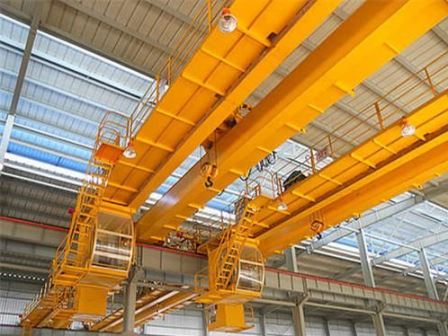
Overhead Cranes
- What are the parts of an overhead crane?
- What is the purpose of an overhead crane?
- How much does an overhead crane cost?
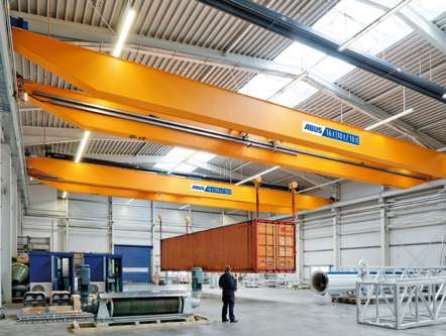
Overhead Crane Test Questions and Answers
- Crane operator interview questions and answers
- Rigging test questions and answers
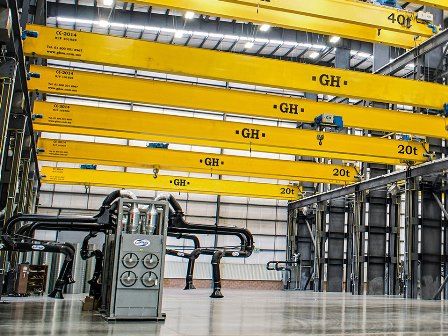
Overhead crane manufacturers in the USA
Some have wondered if in the United States they fix, manufacture, elaborate parts, and components of overhead cranes.
